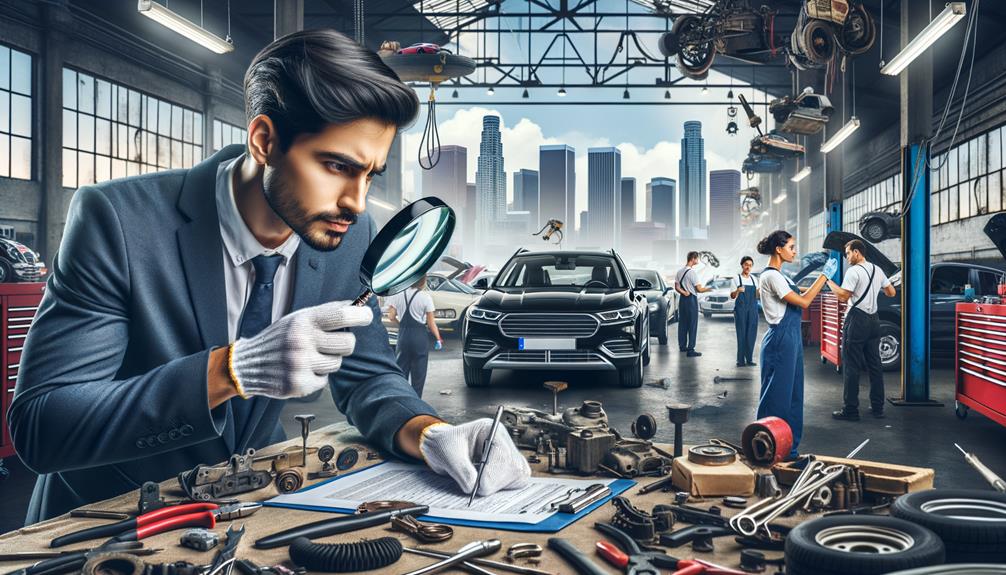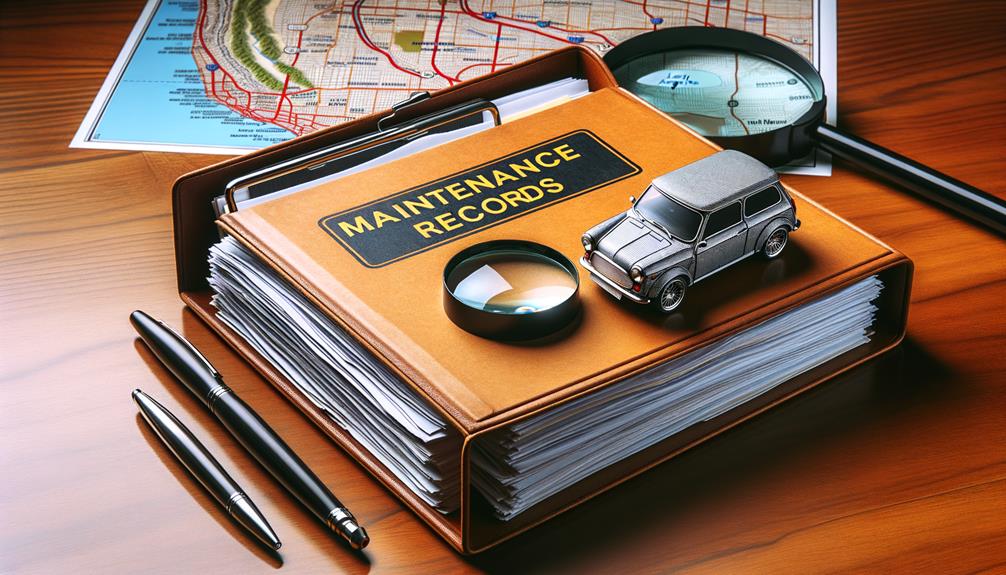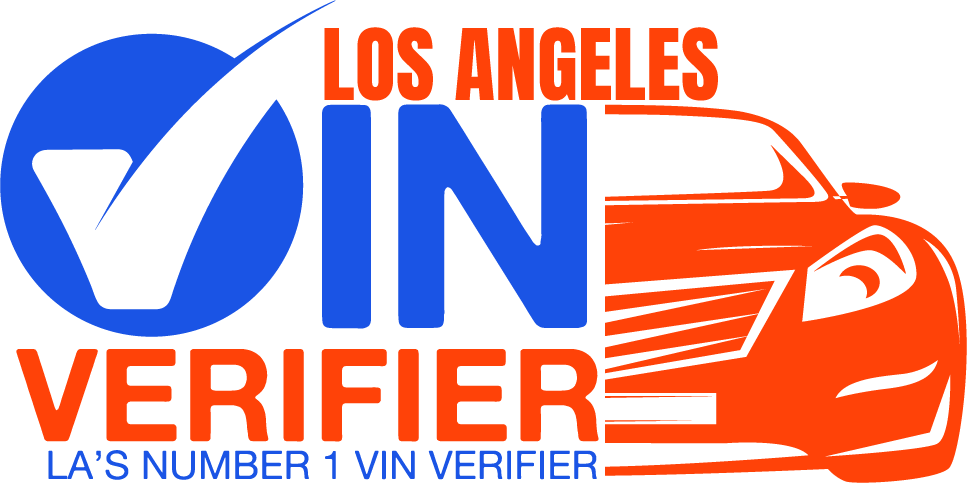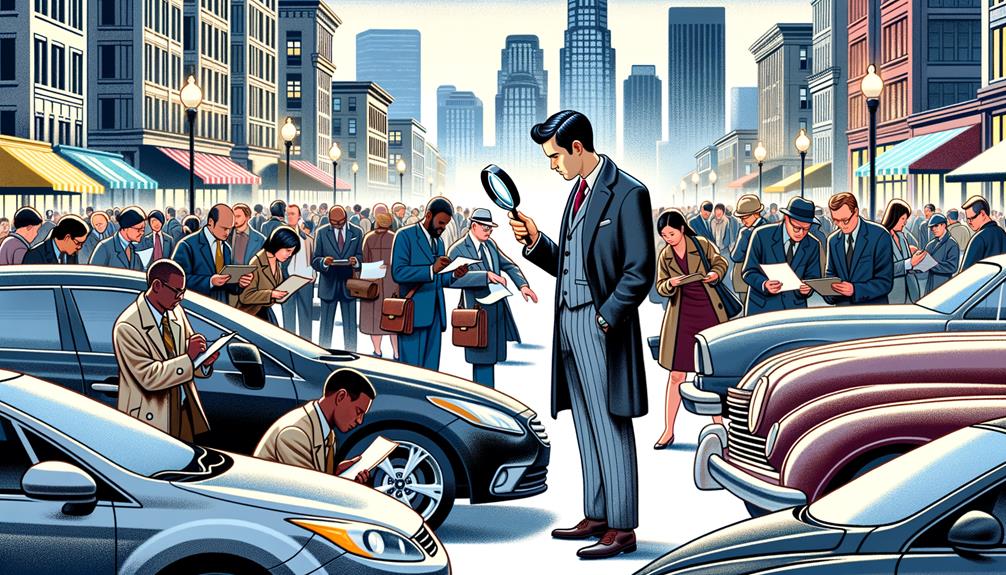When you're hunting for a reliable VIN verifier in Los Angeles, you've got a plethora of options, but how do you sift through them to find a service that best suits your needs? Whether you opt for the DMV, CHP, or a private verifier, each offers unique advantages depending on your situation. Consider what's most important to you: cost, convenience, or perhaps the expertise of the verifier. But, there's more to think about, especially when specific vehicle requirements come into play. Stick around to uncover key insights that could influence your choice and help you avoid common pitfalls.
VIN Verification Overview

VIN verification is a critical step in ensuring your vehicle meets California's registration requirements. This process involves a detailed inspection to document your car's specifics, such as the California VIN, odometer reading, and more. It's not just about confirming your vehicle's identity; it also helps prevent theft and fraud throughout the registration phase.
When you're bringing a vehicle from out-of-state or re-registering a salvage car, vehicle verification becomes mandatory. You're also going to need it if you've purchased a vehicle through a lien sale.
During this inspection, a trained professional will fill out the necessary REG 31 form, which captures all essential data about your vehicle. This form is your ticket to proving that your vehicle is legit and ready for the California roads.
Authorized VIN Verifiers
After understanding the basics of VIN verification, you'll need to choose an authorized verifier in Los Angeles to handle the process.
Authorized VIN verifiers in the city include DMV employees and CHP officers, who offer their services at no extra charge. However, keep in mind you'll need to set up an appointment if you're opting for CHP services, as they require advance scheduling.
If you're a member of AAA, you also have the option to utilize their VIN verification services. This can be a convenient choice if you already benefit from their membership.
For those seeking a more flexible schedule, licensed private VIN verifiers are available. Although they charge a fee, they often provide quicker and more convenient VIN verification services compared to the public options.
It's crucial that your chosen verifier is officially authorized to handle the REG 31 form, a necessity for vehicle registration in California.
Both DMV and CHP officers are equipped to complete this form. Always ensure that any private verifier you might consider is recognized by the state to guarantee compliance with California's vehicle registration requirements, thus ensuring a smooth and compliant process.
Reasons for VIN Verification

You'll need VIN verification for several critical reasons when dealing with vehicle registrations in California.
If you're registering an out-of-state vehicle, vehicle verification ensures the VIN matches the documents you've provided to the Department of Motor Vehicles (DMV). This step is critical in establishing that there are no discrepancies between the vehicle's identity and its paperwork.
When you're thinking about changing your vehicle's configuration, like transforming a bus into a motorhome, VIN verification is required to ensure your modifications comply with state laws. The DMV needs to know that these changes meet safety and environmental standards before they can approve your updated registration.
Furthermore, if you've purchased a vehicle through a lien sale, the verification process is essential to confirm you're the legitimate registered owner. This helps provide legal assurance and prevents potential disputes regarding ownership.
Additionally, re-registering a vehicle that has been declared salvage or junk needs a VIN check. This is to verify that the vehicle meets the necessary safety standards to be back on the road. It's a safeguard that protects you and other road users by ensuring the vehicle is roadworthy and adheres to regulations.
Cost of VIN Verification
Understanding the costs associated with VIN verification is essential as you prepare to register your vehicle. In Los Angeles, you've got several options that vary widely in cost and convenience.
If you're looking to save money, both the DMV and the California Highway Patrol (CHP) offer VIN inspections at no cost. These are great options if you're on a budget and can align with their schedules.
However, if you need more flexibility, private vehicle verifiers like Quick VIN Verification provide personalized services. They charge $45 for on-location inspections if you're able to bring your vehicle to them. For even more convenience, they offer a mobile service that will come to you for $150. This can be a real time-saver if you're juggling a tight schedule.
Additionally, if you're an AAA member, you can take advantage of VIN verification services included as part of your membership benefits, though this doesn't cover mobile services. Local registration services also perform verifications, but their fees and availability can vary, so it's worth checking into a few options.
Comparison of Verification Services

When comparing VIN verification services in Los Angeles, it's crucial to consider the differences in cost, convenience, and service types offered.
The California Highway Patrol (CHP) and the DMV both provide free VIN verification; however, they have their limitations. The CHP restricts its free service to specific vehicles like salvage ones, and you must make an appointment. Similarly, the DMV also offers free verification but requires you to visit in person, which can be inconvenient if you're pressed for time.
On the other hand, private VIN verifiers offer more flexible services. They charge a fee, around $45 for on-site verification and up to $150 for mobile services, but they cater to a broader range of vehicle types and circumstances. This can be a real time-saver if you're unable to travel to the CHP or DMV during working hours.
For AAA members, VIN verification is accessible through AAA offices. However, you'll need to be a member, which comes with its own costs, and they don't offer mobile verification either.
Deciding which option to go for often depends on your specific needs, how quickly you need the verification, and what you're willing to pay for convenience.
Importance and Process
Before registering or purchasing a vehicle, it's crucial to ensure the VIN matches the registration title and the vehicle's condition is assessed by a reliable verifier. VIN verification involves a detailed physical inspection conducted by authorized personnel, such as DMV employees, CHP officers, or licensed private verifiers. This step is essential to prevent fraud, theft, and future legal complications.
During the verification process, the reliable VIN verifier checks the vehicle identification number physically located on your vehicle against the number listed on the registration title. They also review the odometer reading, body type, and emissions label to ensure everything aligns with legal and manufacturer standards. This thorough inspection helps you catch any discrepancies that could affect your ownership rights.
In California, completing a VIN verification is particularly crucial when you're registering an out-of-state vehicle, re-registering a vehicle marked as salvage or junked, or confirming ownership after a lien sale. You'll need the verifier to fill out a REG 31 form, documenting all findings and ensuring compliance with state regulations.
Insights From Vehicle Reports

Vehicle history reports, accessible through VIN checks, provide crucial insights like past accidents and maintenance records, significantly impacting your decision when buying a used car. These reports not only reveal title discrepancies but also expose other potential red flags that could sway your purchase decision.
For instance, a vehicle's history might show a string of unresolved recalls, highlighting safety issues that haven't been addressed. This kind of information is vital as it directly affects the safety and value of the vehicle.
Moreover, VIN verification can uncover odometer rollbacks, ensuring you're not misled about the vehicle's actual mileage. Such discrepancies can drastically alter your perception of the vehicle's worth and longevity.
Maintenance records, another key element found through VIN checks, offer a clear picture of how well the vehicle has been cared for. Regular upkeep speaks volumes about the previous owner's diligence and can forecast potential future expenses.
Understanding these aspects through vehicle history reports empowers you to negotiate more effectively, backed by concrete data. You'll walk into negotiations with the upper hand, knowing exactly what issues might need addressing immediately or what advantages the vehicle holds.
Title and Ownership Records
Checking a vehicle's title and ownership records through a VIN verifier helps you understand its past and assess its legitimacy before purchase.
When you use a vehicle verifier to examine the VIN number, you're not just buying a car; you're also delving into its legal and operational history. Title records, accessed during a VIN check, reveal crucial information such as registration, insurance, and renewal dates. This data isn't just bureaucratic red tape; it's your best tool for determining the vehicle's current standing and future viability.
VIN checks can notably distinguish between clean titles and branded titles, such as salvage or rebuilt. Understanding these distinctions is pivotal, particularly if you're considering resale down the line. A vehicle with a salvage title, often issued in California as a salvage certificate, points to significant past damage and repairs. This is vital info you'd need, especially if you're eyeing previously damaged cars.
Moreover, title discrepancies uncovered during a VIN check can be red flags for potential fraud or registration issues. These discrepancies aren't just minor clerical errors but potentially significant legal barriers that could affect your ability to register the vehicle. Always ensure that the ownership records align perfectly with the title information to avoid future headaches.
Maintenance and Sales Records

You'll gain invaluable insight into a vehicle's history by examining its maintenance and sales records. These records are key to understanding the vehicle's past, including major repairs and services that have been performed. This helps you assess its current condition and reliability.
You'll see details such as open recalls and any outstanding warranty issues, which are crucial for ensuring the vehicle's safety and compliance.
The sales history included in these records provides a narrative of the vehicle's past ownership. It outlines previous owners, sale dates, prices, and mileage at the time of each sale. This information is vital for you to understand the vehicle's valuation over time.
Moreover, accurate maintenance records can confirm odometer readings, protecting you against potential mileage fraud.
When you're gearing up for vehicle purchases, a thorough examination of these documents allows you to make more informed decisions. It also empowers you to negotiate more effectively, ensuring you get the best possible deal.
Considerations for Salvage Vehicles
When considering a salvage vehicle, it's essential to thoroughly inspect its mechanical condition to uncover any hidden problems that could impact safety and performance. Remember, in California, these vehicles are given a salvage certificate, signaling significant prior damage and a total loss declaration by insurance firms. You're dealing with a car that's faced serious issues, so it's crucial to dig deep during your inspection.
Before you can drive your salvage vehicle on public roads, you'll need a VIN verification. This process confirms the car's identity and checks that it meets the California Department of Motor Vehicles' safety and emissions standards. It's not just about legality; it's about ensuring the vehicle is safe to drive.
Moreover, be prepared for the financial implications. Salvage vehicles generally have lower resale values and might be tougher to insure and finance due to their history. You'll need to weigh these factors carefully against the potential savings in purchase price.
Lastly, after completing all necessary repairs, the vehicle must pass a comprehensive state inspection. Only then can it be re-registered and legally driven. So, when you're scouting for a reliable VIN verifier in Los Angeles, ensure they're well-versed with salvage vehicles and the specific requirements they entail.

